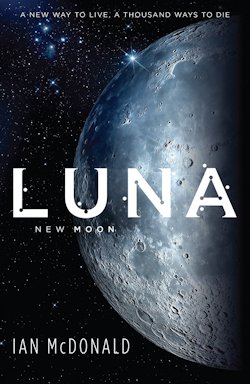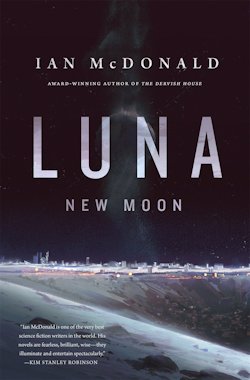I spent a little less than a week reading Luna: New Moon. The first hundred pages took me five difficult days; the remainder I sucked up like a sponge in a single sitting on the sixth; and on the seventh day, I rested, not because Ian McDonald’s new novel is exhausting—though it is, initially—but because its denouement is so devastating I was rather a wreck by then.
Rarely have I finished a book feeling so differently about it as I did in the beginning. If I’d tried to review Luna: New Moon while picking my way through its tremendously dense first third, I’d have struggled to recommend it in any respect. Now, it’s all I can do to resist shouting GAME OF THRONES IN SPACE, as I did on Twitter when I put paid to its last masterful chapter, and signing off with a statement of its unadulterated greatness.
Though I can see this story taking a lot longer than intended to tell, just as George R. R. Martin’s bestselling fantasy saga has, Luna: New Moon is, at the time of this writing, the first volume of a proposed duology that should do for Earth’s only natural satellite what McDonald did for India in River of Gods, Brazil in Brasyl, and Istanbul in his last adult narrative: The Dervish House.
In the five years since that latter won both the John W. Campbell Memorial Award and the BSFA for Best Novel, McDonald has been busy with the Everness trilogy: a reality-spanning romp written for young adults but read by any number of readers older even than me. And perhaps that was the root cause of my problem with this novel; after Planesrunner, Be My Enemy and Empress of the Sun, I’d become accustomed to the aforementioned author at his most approachable.
Luna: New Moon is no such thing, sadly. From word one, there’s so much going on and so very many characters to keep track of that finding your footing on the moon of McDonald’s imagination is almost impossible. To make matters worse, the whole thing starts with a party: a celebration of Lucasinho’s successful moonrun to which all the Cortas have come, including Adriana, the ailing matriarch; her sons and eventual successors, Lucas and Rafa; their sister Ariel, a hotshot lawyer; the worker bee Carlinhos and his wolf of a half-brother, Wagner.
Also in attendance are a few significant serfs, many of the members of the moon’s media, and a riot of representatives of the other four families:
The Mackenzies were the longest established. They had been joined by the Asamoahs in food and living space. The Vorontsovs finally moved their operations off Earth entirely and ran the cycler, the moonloop, the bus service and were wrapping the world in rails. The Suns had been fighting the People’s Republic’s representatives on the LDC board and had finally broken free from terrestrial control. Four companies: Four Dragons.
And the Cortas, whose business it is to mine and refine Helium-3, are the fifth of the moon’s most powerful families.
 Hard-pressed as I am to identify a protagonist from amongst the masses, the closest McDonald comes to a central character must be Marina Calzaghe. A newcomer to the moon—a Joe Moonbeam, according to the local lingo, which, to complicate the start of the narrative still farther, “cheerfully borrows words from Chinese, Portuguese, Russian, Yoruba, Spanish, Arabic [and] Akan”—Marina has been living in awful poverty since setting foot on said satellite’s reclaimed regolith. For her, every breath is an expense, and every drop of water comes at incredible cost, because cheap machines have made people practically perfunctory:
Hard-pressed as I am to identify a protagonist from amongst the masses, the closest McDonald comes to a central character must be Marina Calzaghe. A newcomer to the moon—a Joe Moonbeam, according to the local lingo, which, to complicate the start of the narrative still farther, “cheerfully borrows words from Chinese, Portuguese, Russian, Yoruba, Spanish, Arabic [and] Akan”—Marina has been living in awful poverty since setting foot on said satellite’s reclaimed regolith. For her, every breath is an expense, and every drop of water comes at incredible cost, because cheap machines have made people practically perfunctory:
We always thought the robot apocalypse would be fleets of killer drones and war mecha the size of apartment blocks and terminators with red eyes. Not a row of mechanised checkouts in the local Extra and the alco station; online banking; self-driving taxis; an automated triage system in the hospital. One by one, the bots came and replaced us.
Marina has just lost a close friend to the moon’s cut-throat economy when a contract finally comes in, Catering isn’t exactly her area of expertise, but she’ll do almost anything to keep breathing. So it is that she ends up at Boa Vista, “the legendary garden-palace of the Cortas,” where, in the middle of Lucasinho’s night in the spotlight, an attempt is made on Rafa’s life. He only survives the assassin fly—a trademark of the Asamoah family, by the by—thanks to Marina’s quick thinking, thus the Cortas offer her a permanent position.
As Marina becomes exponentially more entangled in their affairs, working as she does with almost all of the Cortas, so indeed do we. In short, she’s our way in to what is a complicated tale of corruption, conspiracy and all out conflict—the first fires of a fight between the five feudal families that have made the moon into something more than the wasteland that flies across our skies—and if I’d known that in advance, the overwhelming opening of McDonald’s otherwise awesome new novel might have been easier to appreciate.
Even with the pointers I’ve provided, some are likely to find Luna: New Moon desperately inaccessible, and it’s true, to be sure, that a staggered start would have made the beginning of the book more immediately appealing, but I beg you, folks: forge on, because what awaits is almost monolithic in its ambition.
In its gravitas and tension and, alas, tragedy, it’s damn near Shakespearian. Add to that all the compulsive qualities of A Song of Ice and Fire, as I suggested in the header: a setting so brilliantly built and deftly embellished that buying into it isn’t ever an issue; a vast cast of characters as satisfying and sympathetic individually as they are as part of McDonald’s elaborate ensemble; and a plot composed of so many threads that you never know where it’s going to go—except that when it ends, it’s destined to end terribly. The moon is not a safe place, you see:
It knew a thousand ways to kill you if you were stupid, if you were careless, if you were lazy, but the real danger was the people around you. The moon was not a world, it was a submarine. Outside was death. […] There was no law, no justice: there was only management. The moon was the frontier, but it was the frontier to nothing. There was nowhere to run.
Luna: New Moon offers no sanctuary either. Even when you’ve found your feet, it’s not an easy novel to read. You’ll need plenty of patience, a willingness to engage with a world as wicked as it is convincing, and perhaps a pen and some paper to chart the paths of the narrative’s countless characters. For your efforts, I promise you’ll be richly rewarded—and hey, even if you aren’t prepared to pay your way, it’s only a matter of time before CBS sets about broadening the appeal of this magnificent bastard of a book.
Luna: New Moon is available September 22nd from Tor Books (US) and September 17th from Gollancz (UK).
Read an excerpt here on Tor.com
Niall Alexander is an extra-curricular English teacher who reads and writes about all things weird and wonderful for The Speculative Scotsman, Strange Horizons, and Tor.com. He lives with about a bazillion books, his better half and a certain sleekit wee beastie in the central belt of bonnie Scotland.










